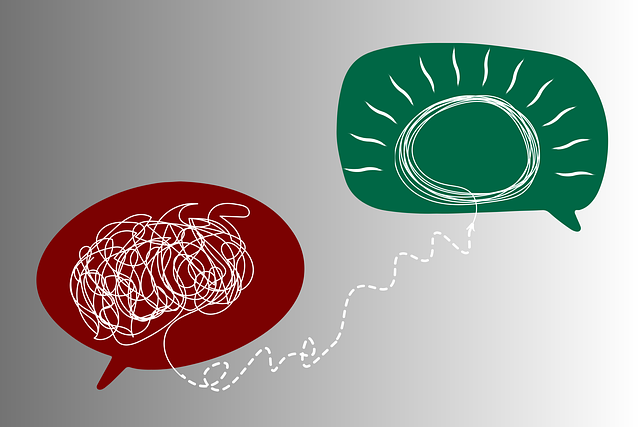Lakewood Psychosis Therapy offers a unique Mental Wellness Coaching program emphasizing holistic support for broader mental health aspects beyond disorder-specific therapy. Coaches collaborate with clients to reduce stress, practice self-care, and personalize emotional healing processes, enhancing resilience and positive thinking. Structured yet adaptable curricula, integrating CBT, mindfulness, and compassion cultivation techniques, empower individuals with practical tools for managing psychotic symptoms and leading balanced lives. Evidence-based strategies, rigorous assessment, and continuous quality improvement ensure program success while fostering mental wellness journeys aligned with Lakewood Psychosis Therapy best practices.
Mental wellness coaching programs have emerged as a powerful tool for fostering holistic well-being. This article explores the development of such programs, focusing on the integral role of Lakewood Psychosis Therapy. We delve into creating effective modules, implementing evidence-based strategies, and measuring success through assessment and continuous improvement. Understanding mental wellness coaching involves recognizing its unique approach to support individuals navigating various challenges, ultimately enhancing their mental health and overall resilience.
- Understanding Mental Wellness Coaching: A Holistic Approach to Support
- The Role of Lakewood Psychosis Therapy in Coaching Programs
- Designing Effective Coaching Modules and Curricula
- Implementing Evidence-Based Strategies for Mental Health Improvement
- Measuring Success: Assessment, Feedback, and Continuous Improvement in Coaching
Understanding Mental Wellness Coaching: A Holistic Approach to Support

Mental wellness coaching is a holistic approach designed to support individuals in achieving optimal mental and emotional well-being. Unlike traditional therapy that often focuses on treating specific disorders, wellness coaching takes a broader view, addressing various aspects of an individual’s life. This includes stress reduction methods, self-care practices, and emotional healing processes tailored to their unique needs. Coaches work collaboratively with clients to enhance resilience, cultivate positive thinking, and promote overall mental wellness.
In the context of Lakewood Psychosis Therapy, coaches play a pivotal role in guiding individuals through complex emotions and challenges. They empower clients by providing tools and strategies to navigate stress, improve self-care routines, and engage in effective emotional healing processes. This supportive framework allows for personal growth, increased mindfulness, and a greater sense of control over one’s mental wellness journey.
The Role of Lakewood Psychosis Therapy in Coaching Programs

Lakewood Psychosis Therapy plays a pivotal role in shaping effective Mental Wellness Coaching Programs. This therapeutic approach emphasizes understanding and managing psychotic symptoms, offering valuable insights for coaches working with individuals facing mental health challenges. By integrating principles from Lakewood Psychosis Therapy, coaches can enhance their ability to support clients navigating complex psychological landscapes.
Incorporating these strategies within coaching programs ensures a comprehensive risk management planning process for mental health professionals. Communication strategies, honed through this therapy, empower coaches to create safe, non-judgmental spaces, fostering open dialogue and encouraging self-reflection among clients. This approach not only aids in early intervention but also promotes effective risk assessment and mitigation, ultimately contributing to the success of Mental Wellness Coaching Programs Development.
Designing Effective Coaching Modules and Curricula

When designing coaching modules for mental wellness programs, it’s crucial to focus on creating structured yet flexible curricula that cater to diverse individual needs. Each module should be meticulously crafted to facilitate a specific aspect of mental wellness, such as stress reduction methods or cultivating positive thinking. Incorporating interactive activities, case studies, and practical exercises ensures that participants actively engage with the material, fostering deeper understanding and personal application.
The curriculum development process should consider the principles of Lakewood Psychosis Therapy, emphasizing evidence-based practices while allowing for personalization. By integrating various therapeutic techniques and self-care strategies, coaches can create a holistic learning experience. This approach not only enhances knowledge but also equips individuals with practical tools to navigate and improve their mental wellness journey, ultimately empowering them to lead more balanced and fulfilling lives.
Implementing Evidence-Based Strategies for Mental Health Improvement

Implementing evidence-based strategies is paramount in the development of effective mental wellness coaching programs. Techniques such as cognitive-behavioral therapy (CBT), mindfulness practices, and compassion cultivation have been extensively researched and proven to significantly improve mental health outcomes. By incorporating these evidence-backed methods, coaches can offer clients tailored support that addresses specific needs related to stress management, anxiety reduction, and mood regulation. For instance, a coach specializing in Lakewood Psychosis Therapy might utilize CBT to help individuals challenge negative thought patterns while teaching mindfulness techniques to promote present-moment awareness.
Additionally, integrating trauma support services within coaching programs recognizes the prevalent impact of traumatic experiences on mental wellness. Many individuals struggle with unprocessed traumas that can manifest as emotional disruptions or behavioral challenges. Coaches trained in risk management planning for mental health professionals can safely and effectively assist clients in processing traumatic memories while implementing compassionate cultivation practices to foster resilience and self-care. This comprehensive approach ensures that coaching programs not only address current mental health concerns but also empower individuals with long-lasting coping strategies for enhancing overall well-being.
Measuring Success: Assessment, Feedback, and Continuous Improvement in Coaching

Measuring success in mental wellness coaching programs is a multifaceted process that goes beyond mere satisfaction surveys. It involves rigorous assessment tools tailored to identify specific improvements in clients’ mental health and well-being. These assessments, often administered at the beginning and end of the coaching program, serve as benchmarks for gauging progress. By comparing outcomes, coaches can objectively evaluate the effectiveness of their strategies, ensuring they align with established best practices in Lakewood Psychosis Therapy.
Feedback plays a crucial role in this cycle of improvement. Regular check-ins allow clients to voice their experiences and perceived benefits, while coach reflections enable them to identify areas needing adjustment. Integrating this feedback into a continuous quality improvement process ensures that coaching methods evolve, enhancing the overall impact on clients’ mental health journeys. Moreover, aligning program assessments with industry standards and incorporating crisis intervention guidance can better equip coaches to support individuals at risk, ultimately fostering positive thinking and resilience.
Mental wellness coaching programs have evolved to become a powerful tool in promoting holistic mental health. By integrating evidence-based practices, such as Lakewood Psychosis Therapy, these programs can effectively support individuals in navigating their mental health journeys. Through careful curriculum design and ongoing assessment, coaches can create personalized modules that address specific needs. This comprehensive approach ensures that coaching remains dynamic and impactful, fostering continuous improvement and empowering individuals to take charge of their mental wellness.








